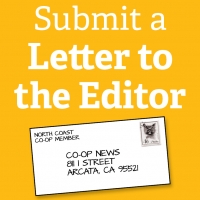
Bylaws | August 2016
Proposed Bylaws Further Explained
 Thanks to all of the Co-op member-owners who took the time to respond to the June Co-op News survey question about the proposed changes to our bylaws pertaining to types of shares and “Fair Share” membership status. The Policies & Procedures Committee (PPC), which drafted the proposed changes in consultation with the North Coast Co-op Board of Director’s attorney, would like to respond to some of the questions and comments that were raised. We’ve summarized questions and comments from member-owners for clarity and brevity. You can find the original presentation of the proposed changes in the June and July issues of the Co-op News.
Thanks to all of the Co-op member-owners who took the time to respond to the June Co-op News survey question about the proposed changes to our bylaws pertaining to types of shares and “Fair Share” membership status. The Policies & Procedures Committee (PPC), which drafted the proposed changes in consultation with the North Coast Co-op Board of Director’s attorney, would like to respond to some of the questions and comments that were raised. We’ve summarized questions and comments from member-owners for clarity and brevity. You can find the original presentation of the proposed changes in the June and July issues of the Co-op News.
The way the bylaws are worded, and the way the changes were presented in the Co-op News, made it hard to understand what the Co-op’s four classes of shares are and why they exist.
The PPC tried to make our proposed changes as clear as possible. However, the bylaws are a legal document which has to be written as precisely and accurately as possible, and sometimes that can lead to complicated or difficult wording. Regarding the four types of shares, this share structure was created by the Co-op’s Articles of Incorporation many years ago. The proposed changes simply add a description of this existing share structure to the bylaws.
The Co-op will soon be publishing a member information document which explains the types of shares in plain language. To summarize briefly: Purchasing an A Share (“Membership Share”) makes you a voting member-owner of the Co-op; each membership can only own one A Share. Member-owners are encouraged but not required to purchase B Shares (“Sustaining Shares”), which constitute an additional investment in the Co-op but do not pay dividends. When a membership has $300 invested in B Shares it is considered a Fair Share membership. C Shares (“Co-op Shares”) are another optional form of investment in the Co-op, and do pay dividends; only Fair Share memberships are eligible to purchase them. D Shares (“Investment Shares”) are a type of share identified in the Co-op’s Articles of Incorporation, but are not currently being issued. All shares are regulated by the California Department of Business Oversight. The Co-op must apply to issue shares and then must follow the parameters of the accepted application.
What does the proposed Section 2.02 mean when it says: “All shares shall be purchased or issued in amounts to be determined from time to time by the Board of Directors, subject to applicable law”?
This language clarifies that the board generally has the authority to determine how many shares to issue and the price of each share. When a member-owner decides to invest in the Co-op, the Co-op “issues” shares. If a member-owner decides to terminate their investment in the Co-op, the Co-op “purchases” the shares back from the member-owner. The board determines when shares can be issued and when they can be purchased, based on the financial state of the Co-op at that time. As the Co-op’s governing body, the board already has this authority, but the proposed changes state that authority explicitly so as to reduce confusion.
What is a “non-cumulative dividend”?
“Non-cumulative” means that the dividend may be paid or withheld at the Co-op’s discretion. If the Co-op did not make a profit in a given year, the board has the option not to pay a dividend on shares. This point is explicitly laid out in Section 9.03(b) of the bylaws. Therefore, the proposed bylaws changes remove the unnecessary use of the phrase “non-cumulative” in Section 2.02.
What is a “paid-up Class C share”?
“Paid up” simply means that the Co-op has been paid for the shares it has issued. Thus, this proposed wording in Section 2.02 makes the common-sense rule that the board can only issue dividends on shares which have already been issued.
How can shares be issued as patronage refunds?
When the Board issues a patronage refund, some portion of that refund may be in the form of shares in the Co-op (usually B shares). Investing in shares is one way in which member-owners provide the Co-op with the needed capital to operate the business, and issuing patronage refunds partially in shares is one way the Co-op can keep needed cash on hand. When a membership is terminated, the Co-op will repurchase shares and give the member-owner the cash value.
If the board raises the threshold for Fair Share membership status, as allowed by the proposed Section 2.08, what will happen to existing Fair Share memberships?
The board already has the authority to change the Fair Share membership status, and the proposed bylaws changes do not add to or reduce that authority. It is also important to note that the proposed bylaws changes do not change the Fair Share membership level, and no such change is currently proposed or contemplated. However, if the board were to change the Fair Share membership level at some point in the future, it would have to decide at that time the fairest way to make the transition. This is a difficult question, and it is one of the reasons that the board rarely changes Fair Share membership levels.
How can we avoid the controversy which arose the last time revisions to the Co-op’s bylaws were proposed?
The last attempted bylaws revisions were indeed controversial. The membership was presented with a completely new set of bylaws, a very complex and extensive document which included changes in policy that were quite significant. A number of member-owners raised serious concerns about the proposed revisions. Furthermore, member-owners did not have the option of voting for certain items and against others; it was an all-or-nothing vote.
This time around, a new committee has formed to work on the bylaws. The Policies & Procedures Committee (PPC) was formed by the board and is made up board members, employees and member-owners of the Co-op at large who are working to ensure that our bylaws are in line with our board policies and our operations. The PPC has chosen to focus on sections of the bylaws that address legal and business issues, with the goal of bringing our policies and practices into alignment. We believe that our current bylaws are basically sound, but there are a few discrepancies, as identified in the proposed revisions. By making incremental changes to the bylaws and explaining the reasons thoroughly, we aim to allow member-owners to vote on specific issues one at a time and avoid unnecessary controversy.
Member-owners are of course always welcome to openly express their opinions about any bylaws changes that are proposed, and to come to PPC meetings to participate in the process of drafting any future changes! Current PPC members are: Colin Fiske (board member), Mary Ella Anderson (board member), John Lucas, Bella Waters (employee) Melanie Bettenhausen (employee), and Alisha Hammer (employee). Any member-owner can participate in the discussion by attending PPC meetings, and anyone who has attended at least three of the last five meetings automatically becomes a voting member. PPC agendas and minutes can be found on our website. Agendas are posted in our stores a week prior to meetings.
There will also be time to discuss all proposed bylaws changes at the Annual Membership Meeting in October. Stay tuned for more on that!




